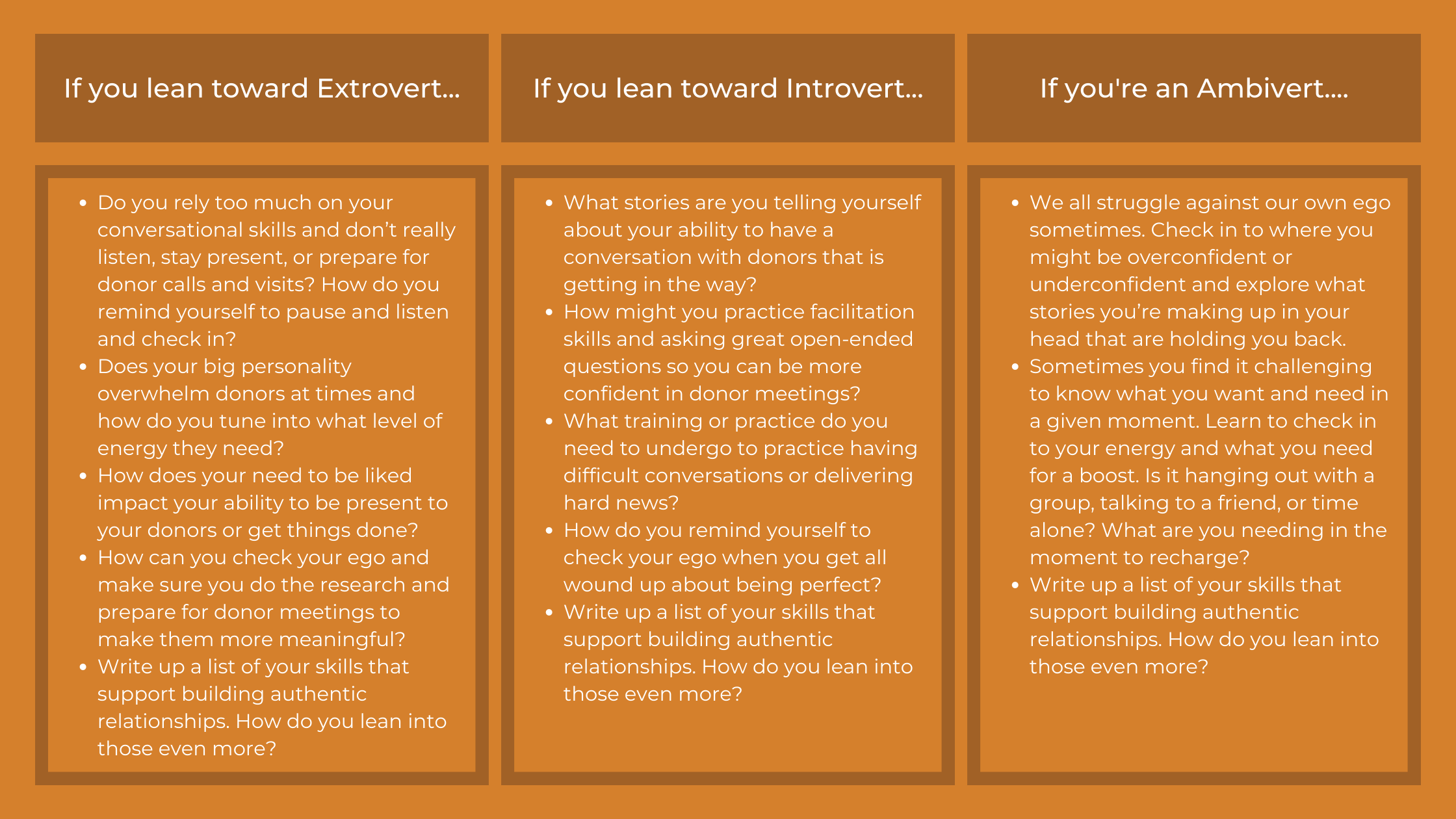Our society sends some pretty strong messages that the best salesperson, and in turn fundraiser, is an extrovert.
And it’s having an impact on the kind of talent entering fundraising. We’ve heard from a lot of introverts who assume that fundraising would not be a good fit for them, or who have been discouraged from pursuing it since they don’t have an extroverted, chatty personality.
This is because we’ve overvalued some attributes that are more typically associated with extroverts:
- They enjoy being social.
- They’re fun to be with and find it easy to strike up conversations with people they don’t know.
- They are bold and don’t shy away from asking for what they want.
I don’t think anyone would argue that these are bad qualities to have if your job involves engaging with other people regularly. But the belief that extroverts are better at sales actually isn’t backed up by research. It’s a societal myth we’ve all bought into.
When social scientists did the research to see if there was a correlation between extroversion and sales success, it wasn’t there. For example, as stated in a piece by The Washington Post, “…one of the most comprehensive investigations, a meta-analysis of 35 studies of nearly 4,000 salespeople, found that the correlation between extroversion and sales performance was essentially zero (0.07, to be exact).”
But what about introverts being too timid to make donor calls, start difficult conversations, or close the deal?!
Before we get into that further, it’s important to clearly define what “extrovert” and “introvert” really mean. It isn’t that extroverts love to talk and introverts are shy, even though that could be true about some individuals. Extroversion and introversion is actually about how you get your energy and how you process information.
Extroverts get energy from talking and being with larger groups of people, while introverts get energy from one-on-one conversations, in smaller groups of people, and from being alone. Extroverts need to process problems or issues out loud with others to help them think through potential solutions, while introverts prefer to process on their own before speaking to others and getting any advice.
You can see how an extrovert would have a blast at a fundraising event, being the life of the party and striking up conversations with everyone. In addition, their assertiveness makes cold calling or meeting with donors they don’t know yet less stressful and more fun.
However, individual fundraising is about building individual, personal relationships of trust. Fundraisers need to be a partner, serving as a bridge for your donors. Doing that requires a very different skill set than just being able to chat up a storm.
A fundraiser I talked to recently had taken our course on asking and shared that it had changed his life. He realized that as an extrovert, he had relied on his conversational skills to the detriment of the donor. He shared how learning in our course that talking all the time, versus actively listening, is really all about ego, was eye-opening. Now he spends more time before a call researching, preparing open-ended questions, and checking himself before a donor meeting. As a result, he is having much more in-depth and meaningful conversations with his donors and has been able to build true partnerships.
And here’s the interesting reality: if individual fundraising is more about creating good relationships one-on-one, then introverts actually have a real advantage over extroverts, not the other way around.
Introverts tend to spend less time talking and more time listening, observing, and asking good questions. If you’re an introvert, your natural tendencies are more aligned with building long-term relationships and providing persistent follow up to your donors.
However, ego can also get in an introvert’s way. When you avoid making donor calls or visits because you are worried about how to start that initial conversation or concerned that you’ll say the wrong thing, that makes it about you, not about the donor.
Taking time to prepare and practice language for introduction calls and donor visits can help lower your stress and increase success. In our Making Effective Donor Asks training, we provide a clear structure on how to facilitate and partner in a donor conversation whether that be about what they care about, inviting them to an event, or making an ask for a gift. Practicing the transition questions as a facilitator, and open-ended questions as a partner, can build confidence and help you approach those initial calls with confidence.
So, both extroverts and introverts have some great skills that help them create meaningful relationships with their donors, and both can be plagued by ego. How does that answer the question of who makes a better fundraiser? Well, research shows that the most successful salespeople are ambiverts.
Ambiverts? What’s that?
To help define the term, I’ll refer to the same piece in The Washington Post that I mentioned earlier, which also summarizes a study by Adam Grant at the University of Pennsylvania’s Wharton School of Management. His goal was to determine whether introverts or extroverts were better at sales.
“He began by giving reps an often-used personality assessment that measures introversion and extroversion on a 1-to-7 scale, with 1 being most introverted and 7 being most extroverted. Then he tracked their performance over the next three months. The introverts fared worst; they earned average revenue of $120 per hour. The extroverts performed slightly better, pulling in $125 per hour. But neither did nearly as well as a third group: the ambiverts.”
In our society, there are more ambiverts than extroverts or introverts, and that basically means on a scale of 1-7 (with a 1 being an introvert and a 7 being an extrovert), you are most likely a 3, 4, or 5. Ambiverts have a combination of both qualities. The assertiveness of extroverts combined with the calm confidence of an introvert helps you make those donor calls but also be present and listen to your donors.
So, what we typically describe as extroverted or introverted is describing those who rank on either end of the scale.
If you are wondering if you’re an ambivert, answering yes to these questions means you most likely are:
- Do you feel like you don’t really fit as an extrovert or introvert?
- Do you enjoy social interaction as much as you enjoy time alone?
- Can you be equally drained by too much social time or too much alone time?
- Is good conversation just as comfortable for you as silence?
- Do you enjoy small talk but also love more in-depth conversations?
- Do you have a number of friends along with a handful of close friends?
If you are interested in learning where you fall on the scale, there are a number of personality tests available to help you gain insight. Here is a Myers Briggs test you can take that provides a good bit of free feedback, with options to purchase more in-depth information if you choose.
But what if you do lean toward extrovert or introvert? Then, you need to lean into your strengths and continue to learn and develop where you have challenges.
Here are some questions to help you process where you might run into barriers, so you can bring your best self:

I hope this has given leaders and fundraisers some food for thought on what qualities make up a great fundraiser. Maybe this has confirmed to you some reasons you don’t love your job. I would encourage you to use the process questions above and see if you can build some of the skills and confidence you need. Even though I’m an ambivert, before I did a lot of personal growth work, I still struggled with making those calls to donors, having difficult conversations, and knowing how to really listen and be present to donors. So, I do know that it’s possible to develop these skills.
And, a quick warning label on this conversation, it can be dangerous to put yourself or others into boxes where you create limitations and judgments. We as humans are complex and most of the time fall on a continuum, rather being completely one way or another. So, instead of this conversation presenting a limitation in any way, I hope it has opened your curiosity to what skills you do have, and how you can build your capacity to be successful in your work.
Karen

![Smiling mid-level officers sit in a row. [What are the Key Traits of Extraordinary Mid-Level Officers?]](https://veritusgroup.com/wp-content/uploads/2021/04/AdobeStock_492000057.jpeg)





This is so interesting. I have always said that I am an introvert leading and extrovert’s life. So maybe I am a little of both? Thanks for this article. I really enjoyed it.
You very well might be! We’re glad you enjoyed the article.